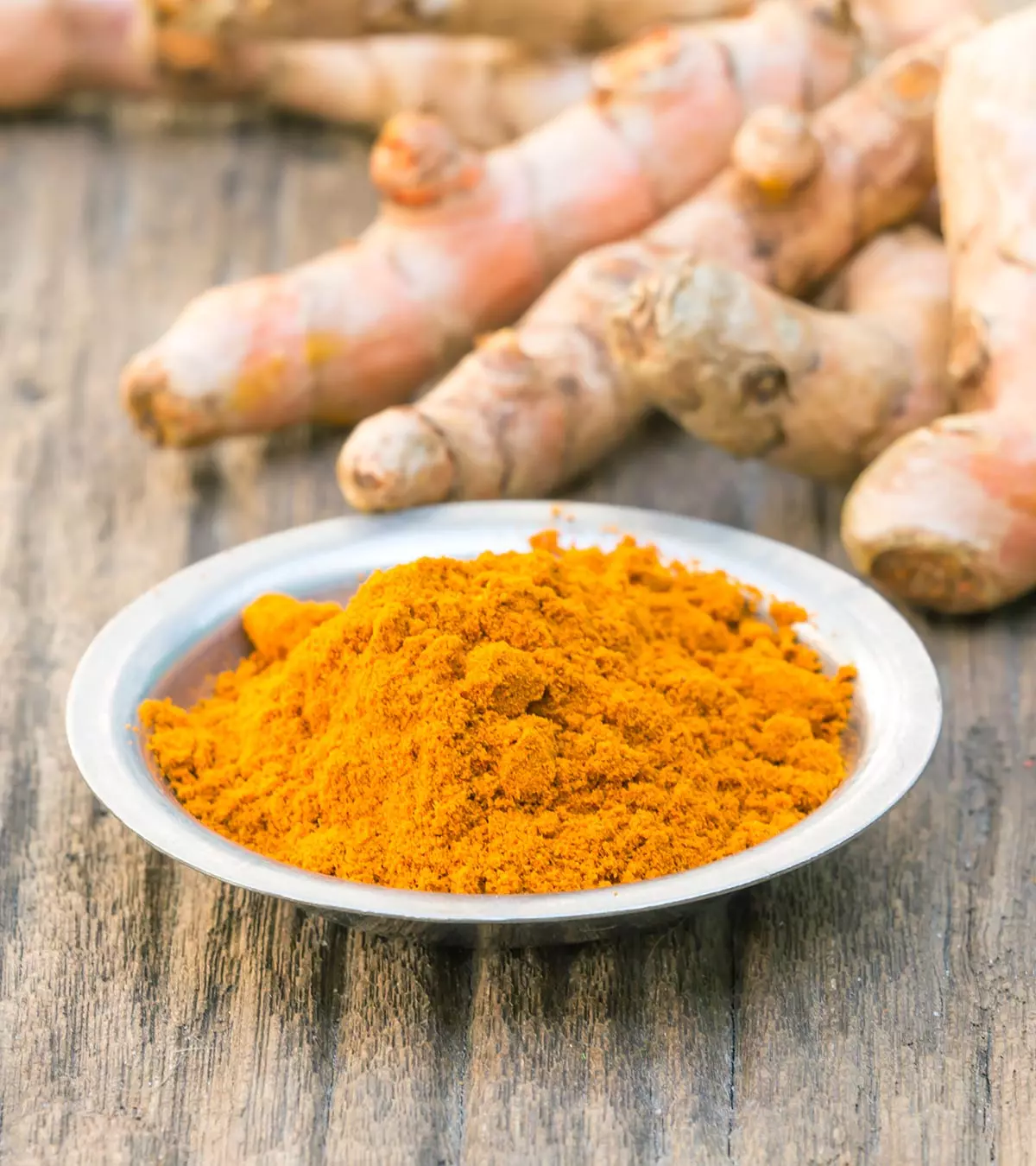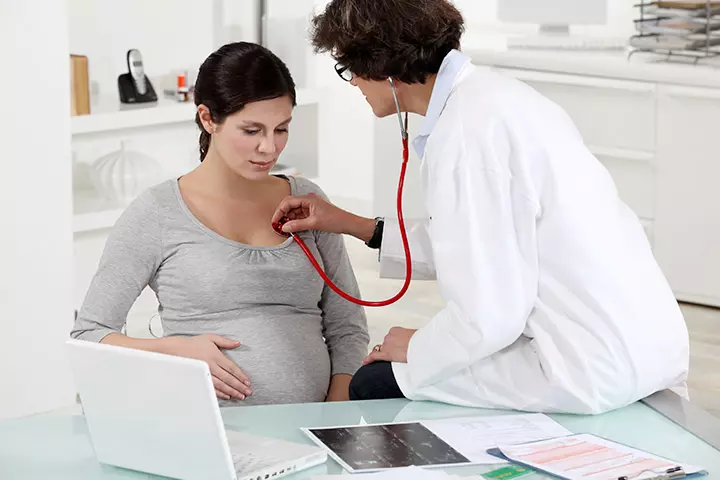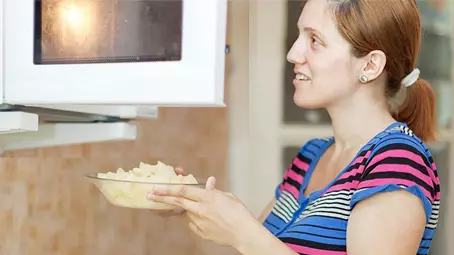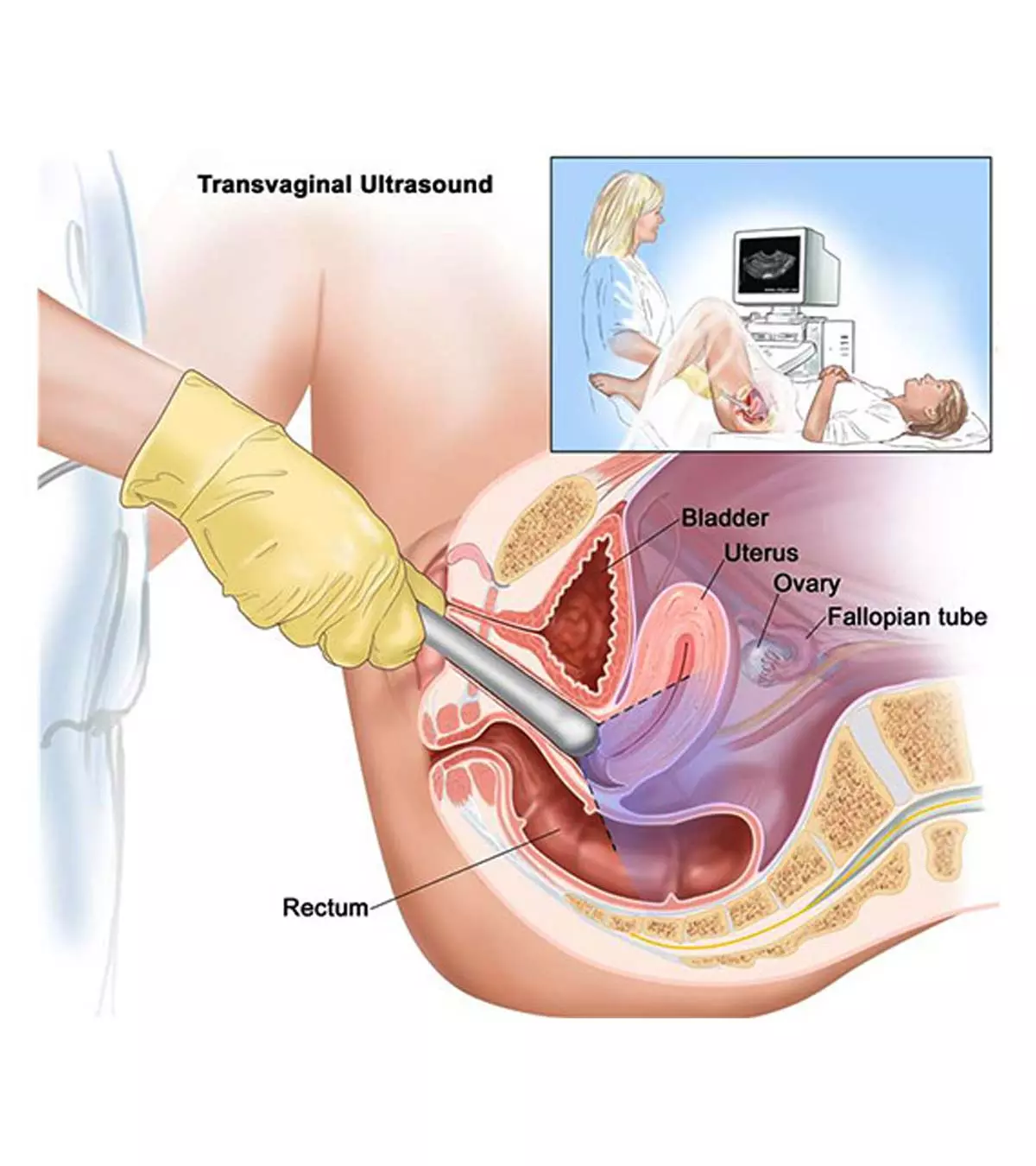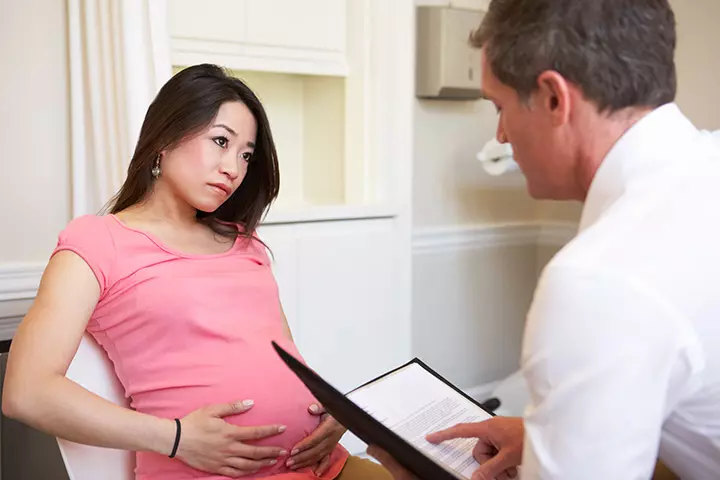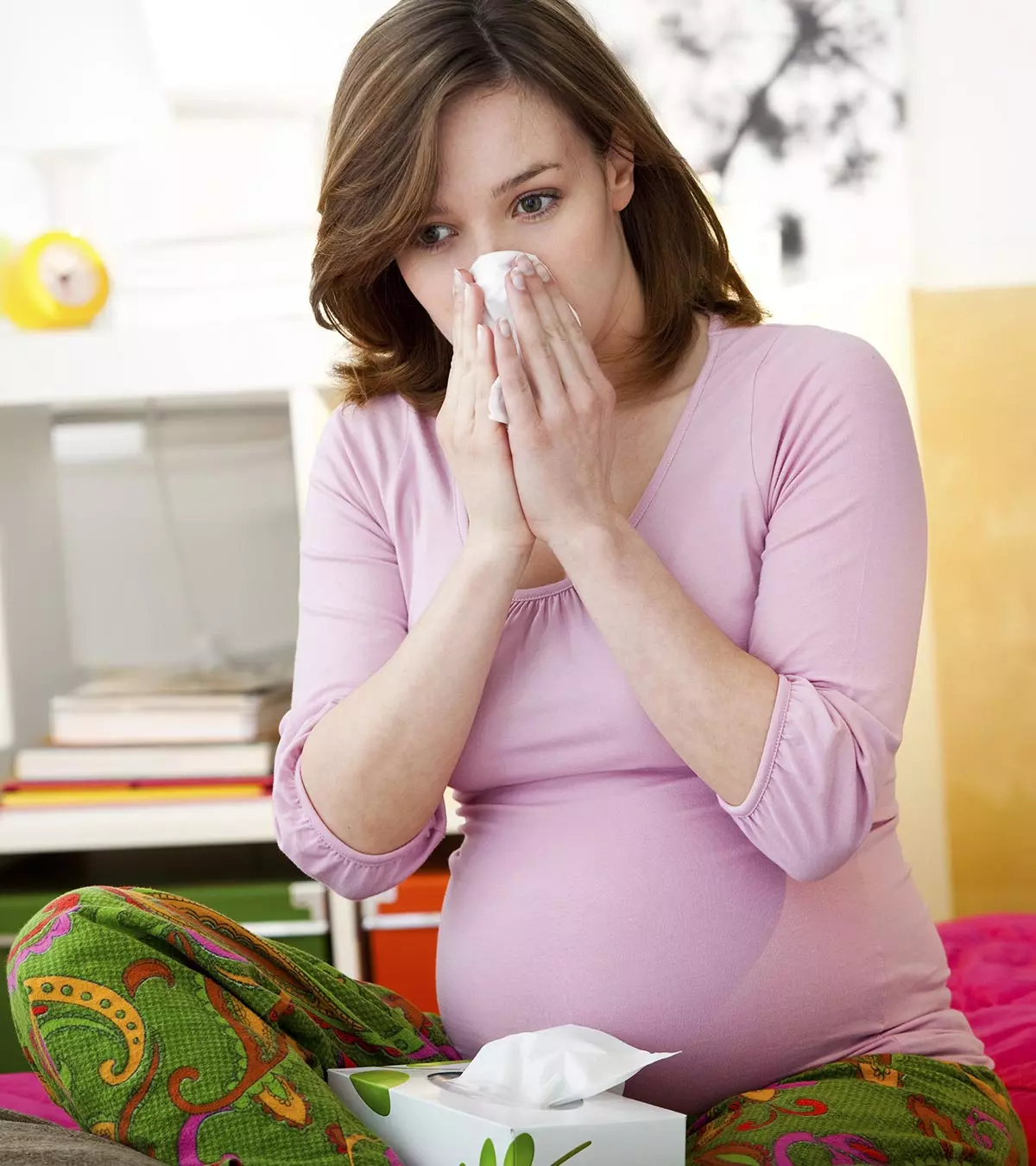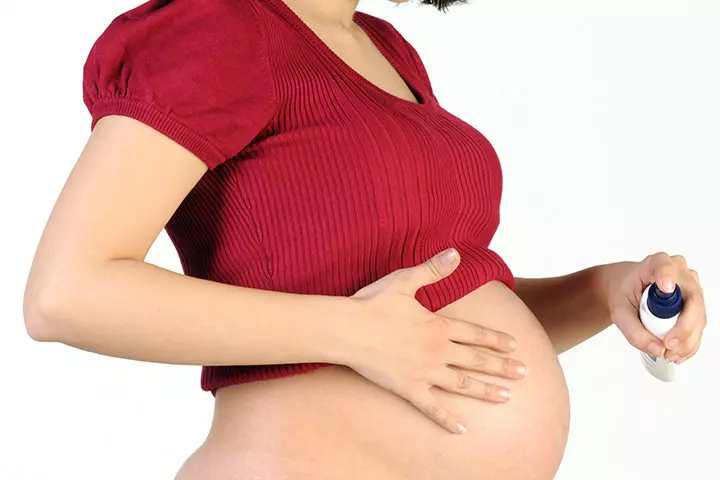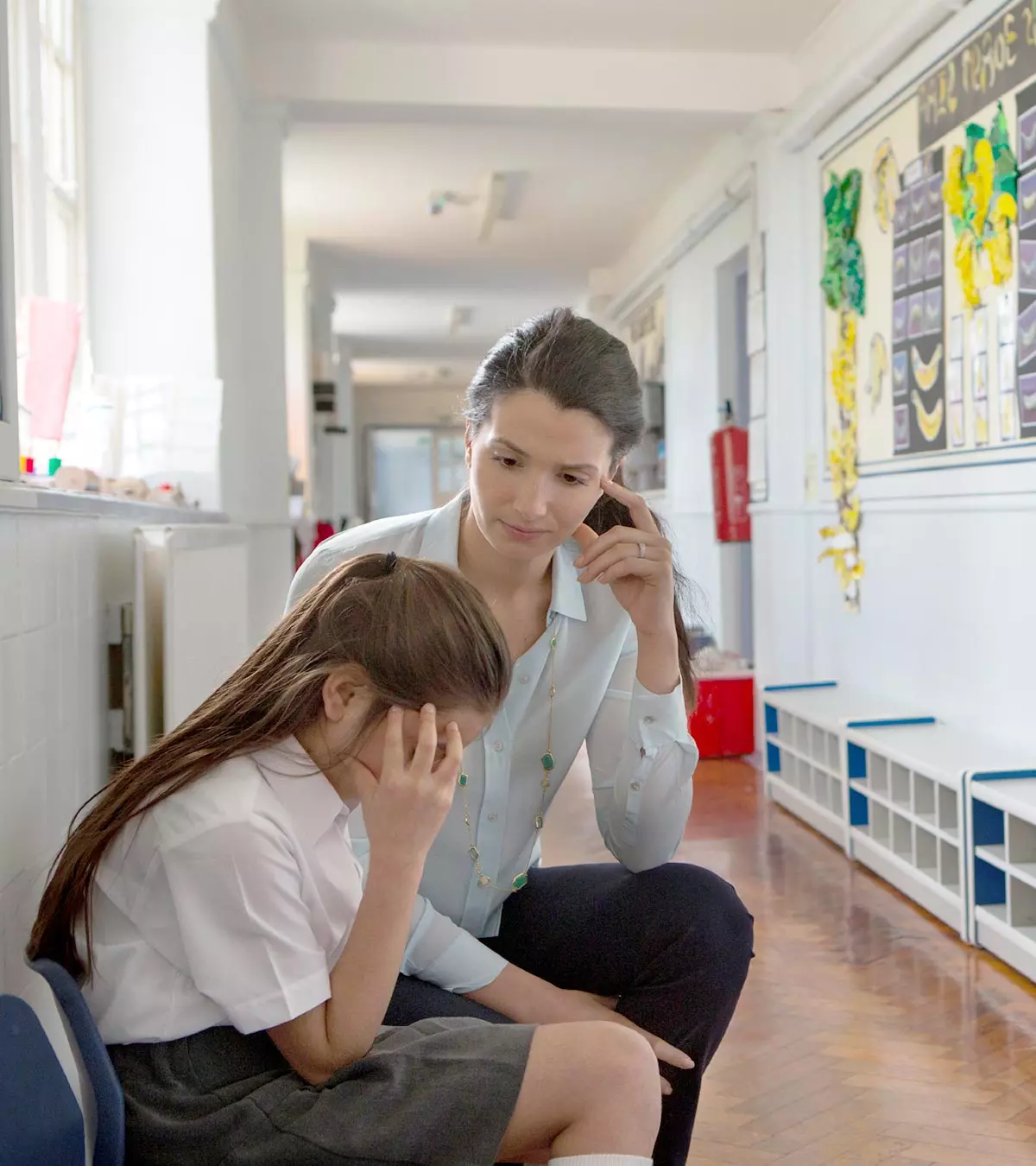
Image: iStock
The onset of menstruation or period might be stressful for some girls as it is associated with abdominal pain and other accompanying symptoms such as irritability, mood swings, lack of concentration, fatigue, nausea, weakness, and abdominal or back pain. However, knowing how to deal with periods or the menstrual cycle, which typically lasts about 28 days and includes phases like the follicular phase, ovulation, and the luteal phase, is crucial. Proper sex education helps girls learn about healthy menstrual health practices, which in turn helps them be more aware of what to expect. Maintaining a healthy diet plan and proper hygiene are a few ways you can tackle these two to seven days of periods. Read on to learn more about the common issues related to the period in teens and ways to deal with them.

Key Pointers
- Some girls experience symptoms after getting their first period, such as nausea, pain, vomiting, and weakness.
- Girls should be guided to be prepared and speak with their teacher to contact a parent if they get their first period at school.
- Parents must guide their daughters to have spare clothes in the school locker and always carry pads or tampons.
- If girls experience pain, they may be given a pain reliever before leaving for school.
- Lying down or gently rubbing the abdomen can relieve cramps while on their period at school.
Understanding Menarche
Menarche is the first menstrual cycle. Menstruation and puberty in girls are not always things to worry about if you understand that they are all about growing up and transforming from a kid to a young lady.
Some girls face a lot of pain and discomfort and they end up associating their period with all their negative emotions. But there are also other girls who take this in their stride and treat their period as something very natural, something not to get anxious about. It’s important to increase your menstrual awareness during this phase of your life and stay prepared to deal with your period at school or anywhere outside the home.
 Quick fact
Quick factDealing With Your First Period At School
For girls in puberty, the unpredictability of their period, especially the first one, is an important issue. But that is how the timing of a period is – unpredictable. One question that raises their anxiety levels is, “What if I get my first period in school”. Most girls are anxious on how they would deal with the situation if they get their period at school or outdoors. Staying prepared is the key. Here are a few tips to follow:
1. Do not panic
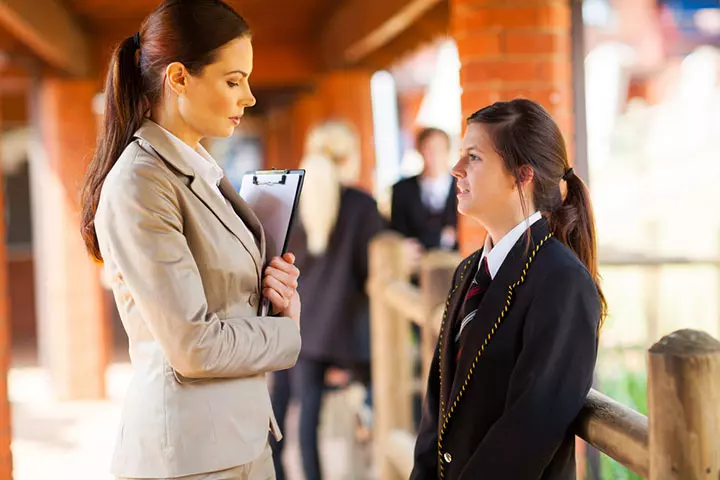
You might be at school enjoying a snack or on the basketball court playing your best shot, and you may feel dampness indicating that your period has arrived. Don’t panic or lose your calm. You can go to your school nurse or teacher and ask for some supplies if you are unprepared. You might be nervous and may want to have your mother around. You can ask your school counselor to get you in touch with your mom.
2. Talk to your teacher
If this is the first time you have got your period, talk to someone you can rely on. Preferably, speak to your teacher in school instead of talking to your best friend as this is a new situation and it is important to receive proper menstrual education. Your teacher can provide you with information on what to expect and how to manage your period. The other alternative is to speak to the school nurse.
3. Have spare clothes
Leave some spare clothes in your school locker. This will help you to change if the dress you are wearing gets stained. However, it is quite unlikely that your first period will be heavy. If you don’t have anything in the locker, use your jacket to cover up the stain. Just tie the jacket around your waist until you can get home. You may want to take permission from your school to leave early. You also can call your mother to bring a set of clothing to school so that you can change.
4. Not necessary to share details
If you change your clothing, your friends and classmates will notice it. Stay calm. Instead, tell them that you spilled something on yourself and hence, you changed your clothes. There is no need to divulge the details and feel embarrassed.
Managing Your Period At School – What You Should Do?
Getting your period at school, whether it is your first period or the subsequent ones, can be a little embarrassing and uncomfortable, not to mention the feeling of uneasiness and the cramps it brings along. In simple words, surviving your period at school is not easy, but does that mean you miss your school? Of course, not!
Managing your heavy period at school becomes easier when you have a plan and follow a disciplined approach. In most cases, your friends and teachers won’t even know it’s your period. The most important thing is to have your supplies in place so that you are not caught unaware. It is important to understand that you should not be embarrassed but proud to get your period. This will keep you positive and keep your spirits up. As for how to manage your period, here is what you should be doing:
1. Be prepared
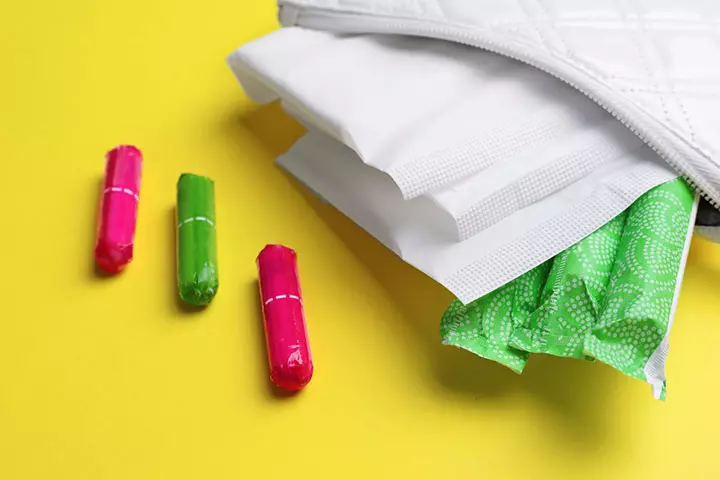
Always have your pads, tampons, panty liners and everything else you use to get you through your heavy periods without any unpleasant surprises. Here are some tips to help you with your menstrual bleeding:
You can use the menstrual cups too. These are inserted into the vagina, and the blood and discharge are collected at its base. These cups last for about 10 hours so for school trips and other such events, this can be a good option as you may not have to change often.
If you think you will have your period today as per your cycle, put on a pad or your panty liner before you go to school. That way, you will not have to worry about any leaks or stains.
 Point to consider
Point to consider2. Find a good place to stash your pads
You don’t have to worry about someone seeing your sanitary supplies but if you feel embarrassed and don’t want anyone to see your menstrual products, find a good place to store them. It‘s nice to have a separate bag within your school bag for your period supplies or in your locker.
3. Pack an extra pair of underpants
An unexpected period at school would mean a leak or a stain. Practically, this might not be a problem because when your period starts, you won’t have a heavy flow immediately. The menstrual flow will gradually increase and by then you will have your period supplies in place. However, there can be times when you may have a leak. Hence, having an extra pair of underpants can be a great idea. This will make you feel more confident about yourself, and you will not look worried.
Carry a sweater or sweatshirt or have it in your emergency period bag. You can use it to tie it around your waist to hide any stains if there happens to be a major leak and your dress gets spoiled.
4. Keep some chocolate too
According to the US National Institutes of Health (NIH), approximately 80% to 90% of women experience at least one of the symptoms that are commonly associated with PMS (3). If you have the regular premenstrual syndromei (PMS) thingy, you may want to pack something extra in your period bag to uplift your spirits. Studies indicate that a bar of chocolate can instantly make you feel happy and emotionally stable, and of course, who doesn’t love to treat themselves to some delicious, heavenly chocolate?
5. Have a pain reliever before you go to school
Period pain at school can not be manageable sometimes. If you are expecting your period today, have a pain reliever that you usually have for your menstrual cramps before leaving home. This will avoid you even the minimal discomfort. Make sure that you don’t use any medications without your doctor’s advice.
6. Know when to expect your period

During the initial months, chances are high as your period has not yet regularized. This will often create confusion over your next period. In this regard, listen to your body, and remember that irregular periods in teens are normal in the initial years. Understand the menstrual symptoms that you usually experience before the onset of your period and keep a track of these.
7. Make your DIY emergency pad
If you are running out of options and you are not sure about getting supplies when you have your surprise period, you can try making an emergency pad yourself. Use toilet paper and turn it around your hand for a good ten times. Keep this thick layer of toilet paper on your panty and take another long piece of it and wrap it around again to fasten it. You are set for at least a couple of hours.
 Quick tip
Quick tipManaging Your Period On School Trips
When you are going on school trips, your period may make you feel less interested and excited about being out with your classmates. But don’t let the period bother you too much. Understand that you can do just about everything when you have your period, it all calls for the right protection.
In such situations, cervical or menstrual cups are the best as you will not have to change them often nor will you have to worry about a leak or a stain. Tampons are great too as they don’t smell as much as the sanitary pads and are often more effective than the pads.
Stay hydrated, and ask for regular stop-overs if you are traveling by road with your friends. Remember that you will need to change your pad or tampon regularly to avoid any embarrassment and risk of infection and hence, it is better to make sure that you stop on your way rather than regret later.
How To Get Rid Of Period Cramps At School?
Period cramps in school can be quite annoying, especially when you have them at school. You would not want to tell others that you have your period but at the same time find it difficult to deal with the pain.
In such cases, you can have a Meftal-Spas tablet before heading to school. Some schools don’t allow their students to take this medication on campus so if your period is regular and you get cramps regularly, try taking the painkiller before going to school.
You can use the mini stick-on heating pads under your clothes for pain relief. Also, do gentle stretches, practice deep breathing, have a healthy diet, and keep your spirits up, as this can impact how you deal with cramps (4).
Here are some quick tips that will help you with menstrual cramps at school:
1. Lying down, if possible, is an excellent way to deal with cramps. You can take a nap in the girl’s room if you have something of that sort in your school. Most schools have a sick room for students. Make use of that.
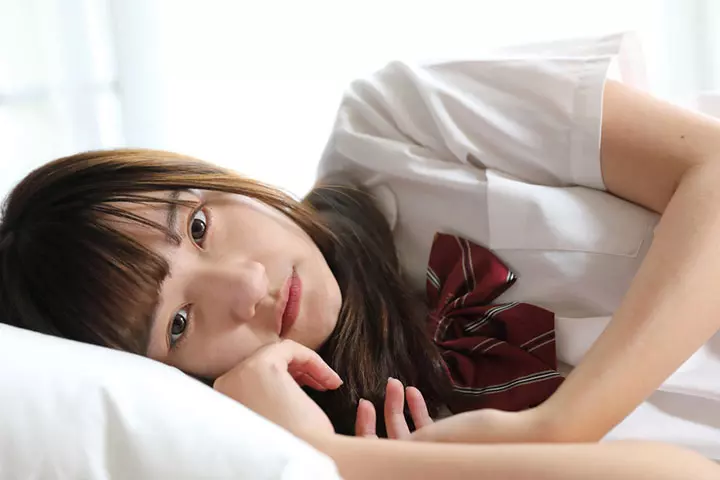
2. Gently rub your abdomen when you go to the washroom. This will ease the pain. Massage in a clockwise or anti-clockwise direction to ease the cramps.
3. Stretch a little by walking around for some time. Walking relaxes muscles and allows them to get loose. This, in turn, helps with abdominal pain and cramps.
Sometimes, menstrual cramps can be excruciatingly painful, and unbearable. This could be due to an underlying health condition such as endometriosisiThe condition identified by an abnormal growth of intrauterine tissues outside the uterus and causes irregular and painful periods or uterine fibroidsiAbnormal growths or tumors (mostly non-cancerous) in or on the uterine walls (4). Treating the underlying condition is important to alleviate the pain. So consult a qualified gynecologist right away if you suffer from severe menstrual cramps.
If there is no reason for the cramps, the doctor will prescribe a painkiller to help you deal with it. The good news is in most cases menstrual cramps tend to decline on their own as you age.
The menstrual problems that you may be facing can range from pain to cramps to irregular periods. Here are a few home remedies that you can try to get some relief.
1. Radish seeds
For delayed periods, one of the best home remedies is to grind radish seeds and consume the powder with buttermilk. Drink this concoction on a daily basis for effective results. While scientific evidence is limited, this remedy is believed to stimulate menstrual flow (5). Usually, cycles are irregular for the first year, so don’t worry too much.
2. Parsley
Parsley is another very useful herb that eases menstruation-related problems, particularly if you have a delayed period. It may help with period issues by supporting hormonal balance and promoting estrogen production. It can be helpful in managing conditions like premenstrual syndrome (PMS) and delayed periods. Drinking parsley tea may also help reduce menstrual discomfort and cramps, making periods more manageable (6).
3. Gooseberry
Gooseberry, which is high in Vitamin C, is effective if you tend to bleed heavily during your period. Antioxidants and vitamin C present in gooseberries may help control heavy menstrual bleeding by strengthening blood vessels, making them less likely to break and cause excessive bleeding
4. Chamomile tea

Consuming chamomile tea every morning is an effective way to get relief from menstrual cramps (5). Chamomile possesses anti-inflammatory and antispasmodic properties, which can help relax uterine muscles and alleviate menstrual cramps (7).
5. Hot water pack
Lie down with a hot water pack on your abdomen to ease the pain menstruation brings on. It works by improving blood flow in the pelvic area, which reduces swelling and congestion that put pressure on nerves. Heat also relaxes the abdominal muscles and eases tension, helping to reduce cramps caused by muscle spasms. This combined effect makes period pain more manageable and provides comfort (8).
6. Workout
A low-intensity workout can be helpful in case of abdominal cramps. Yoga and meditation are also very relaxing .On lighter period days, engaging in moderate aerobic exercises like walking or light jogging can help with bloating and cramps. Physical activity improves blood circulation and triggers the release of endorphins which are hormones that relieve pain and boost mood (9).
 Quick fact
Quick fact7. Nutrient-rich food
Consume foods that are rich in calcium, magnesium, and zinc to deal with monthly menstrual cramps (10). You can even opt for a cleansing diet right before your menstruation to fortify your system. Studies indicate that this will have a positive impact on menstrual cramps.
 Quick fact
Quick factHow To Prevent Pads From Leaking While On Period At School?
You can use one or a combination of the following tips to prevent your pads from leaking while you are at school.
- Wear pads of correct thickness and length
Remember you get pads of varying thickness and length. So coordinate your pads based on the flow. If you have a heavy flow, use a super pad, which is more absorbent and longer than a regular-sized one. On days, when the flow is lighter, wear regular pads. This will go a long way in preventing leaks.
- Place Your Pads Correctly
Putting your pad correctly in your underwear will prevent leaks. Do not stick the pad too far up or down. Place it snugly at the bottom but the middle of your underwear. Press it slightly so that it sticks properly to your panty.
- Use panty liners in conjunction
You can put a panty liner under the pad for extra protection. Place it perpendicular to your pad to get more coverage. Wear tight underwear that fits the groin region, so that the panty liner does not become loose.
- Wear a thicker underwear
You can reduce the chances of leaks while on your period at school by wearing a thicker panty. Of course, this is not a foolproof method, but it will be more absorbent than a normal one.
How To Make A Period Bag For School?
When you enter menarche, which is another name for getting your first period, it will be irregular. The last thing you need is getting caught in school unprepared. So it helps to have a period bag handy with everything you need should you get your period in school.
Here are some of the things you should always have in your period bag for school:
- A bag with zipper
You need a bag which is big enough to carry your period supplies, but small enough to fit into your school bag or locker. A makeup bag is ideal for this purpose, especially because it comes with a zipper and is discreet enough to carry around in your bag.
- Calendar
Always keep a small calendar in your period bag to make note of the day you start your period. This will give you a rough idea about the next period if your menstrual cycle doesn’t follow the 28-day cycle. Remember, in the initial few years, you might face menstrual irregularities. So it is a good idea to note down the date so that a week before the due date, you can start using panty liners.
- Spare underwear
Always keep an extra panty in your period bag so that you can change in case of a leak. The underwear will also come handy if you get your period all of a sudden. If you stain your panty, don’t worry. Rinse it with cold water and soak the stain in hydrogen peroxide before washing it. It will remove the stains.
- Bags for used items and disposables
After changing your panty liner or sanitary pad, you need to dispose of them hygienically. Don’t try flushing them down the toilet, as they are not flushable. Place several bags in your period bag that you can use to dispose of the used panty liners, tampons, and pads. You can throw the bag in the toilet bin or carry it home and chuck it into your bin. You can get scented bags to keep odors at bay. Menstrual blood does have an odor, and you may not want anyone to get a whiff of it from your disposables.
- Painkillers
Menstrual cramps can be debilitating for many girls. If you experience cramps and have not learned to cope with them, you will want to carry painkillers in your period bag. Make sure your doctor gives the go-ahead to take the medication.
- Tissues
Always carry tissue in your period bag. They are perfect for cleaning your genital area and wiping your hands. Never use baby wipes, hand wipes or feminine wipes in your genital region, as they can result in irritation or infection.
Frequently Asked Questions
1. How to hide my period from everyone?
While menstrual stigma may cause embarrassment, periods are nothing to be ashamed of—they celebrate womanhood. However, they are personal, and you may not want to announce them through leaks or stains. Here’s how to keep things discreet:
2. How do I tell my mom I got my period?
It can be overwhelming and frightening or exciting and thrilling when you get your first menstrual period. Regardless of how you feel, it is important you let your mother know about it. This will make it easier to get the necessary supplies, and your mom will also give you tips to deal with your period. Just go and tell your mom about the blood stain on your panty, and she will understand. Don’t feel shy or embarrassed as she knows that you are of the age to get a period. She must be preparing in her way for it.
3. What can I do to keep my spirits high during periods at school?
Your period at school may be a little frustrating to deal with, but if you have a positive attitude and follow the below-mentioned measures, things will get a lot easier for you.
4. How can I prevent the period leak in school?
To prevent period leaks in school, it’s important to manage your flow effectively. Leaks typically happen when a pad or tampon becomes too full and can no longer absorb blood, especially during heavy periods or when not changed regularly. To avoid this, change your pad or tampon frequently, depending on your flow and the day of your period. If you usually have a heavy period, you should try using the extra thick and long pads. Using a double pad on the first and second days of your period will help. This will take care of the heavy flow better than a single pad.
5. Should I change my pad even if there is no blood?
You should change your pad every three to four hours, even if there’s no blood. This is good hygiene practice, as bacteria may build up if the same pad is used for longer durations (12).
6. What are some healthy food choices to make during my period?
It is best to consume foods rich in iron, vitamin C, vitamin K, and Omega 3, such as dark green leafy vegetables, lentils, beans, citrus fruits, berries, broccoli, bell peppers, eggs, cheese, flaxseeds, tree nuts, and fishes like salmon during your period. While fast foods and chips may offer comfort, they also cause hormonal imbalances. Nutrient-rich foods may keep you healthier and help you tackle your menstrual symptoms (13).
7. What are some common symptoms associated with menstruation?
Common symptoms of menstruation include cramps, which cause pain in the lower abdomen; bloating, which is a feeling of fullness or swelling; and mood swings or fatigue, often triggered by hormonal changes.
8. What are some effective ways to deal with period-related symptoms such as headaches, back pain, fatigue, anxiety, and nausea?
Eating healthy meals at frequent intervals, getting adequate rest, staying hydrated, and avoiding heavy workouts can help you manage most of your symptoms. Additionally, you may consider stretching exercises, massages, and hot packs for back pain. However, if you are getting increasingly anxious or experiencing intolerable pain, nausea, or fatigue, you may consider obtaining pain relief and other necessary medications from your doctor (14) (15).
9. Is it normal to have irregular periods?
Yes, it is normal to have irregular periods, especially in the first few years after menstruation begins. Factors such as hormonal fluctuations, changes in body weight, stress, dieting, heavy exercise, and certain medications can also contribute to irregular cycles.
10. How can I stay comfortable during my period while exercising?
You may have less energy during your periods and opt for low-intensity workouts such as stretching, walking, yoga, or pilates (13). In addition, a few general precautions, such as wearing comfortable clothes, changing the pad before and after exercising, staying hydrated, and ensuring adequate calories, may help keep you comfortable.
If you get your first period at school, stay calm and talk to your teacher. You should not feel embarrassed because it is a natural process, and every girl goes through it. After your first period, you may start following a proper routine and carry extra pads or tampons to school. To stay comfortable, change your pads when required. If you get cramps at school, talk to your teacher, stretch your muscles, or lie down for a while. Eat nutritious food and exercise regularly to stay healthy and pain-free during menstruation.
Infographic: Playing Sports During Periods – Precautions To Take
Indulging in sports and other active play may be uncomfortable during the menstrual cycle for some girls. However, menstruation is a physiological process that should not stop you from pursuing your hobbies and dreams. Check out this infographic for lifestyle modifications and other medical management tips to make your gaming experience during periods easier.
Some thing wrong with infographic shortcode. please verify shortcode syntax
Illustration: How To Deal With Your Period At School? Tips & Home Remedies

Image: Stable Diffusion/MomJunction Design Team
References
- Using Foods Against Menstrual Pain.
https://www.pcrm.org/good-nutrition/nutrition-information/using-foods-against-menstrual-pain - Getting Your Period at School.
https://kidshealth.org/en/kids/period-school.html - Premenstrual Syndrome.
https://www.ncbi.nlm.nih.gov/books/NBK560698/ - Menstrual pain.
https://www.mountsinai.org/health-library/condition/menstrual-pain - Majing Jiao et.al; (2025); Comparison of Herbal Medicines Used for Women’s Menstruation Diseases in Different Areas of the World.
https://pmc.ncbi.nlm.nih.gov/articles/PMC8854496/ - Dr. Puneeta Ajmera et.al; (2019); Parsley-benefits & side effects on health.
https://www.journalofsports.com/pdf/2019/vol4issue1/PartAA/4-1-308-629.pdf - Zahra Bostani Khalesi et.al; (2019); Efficacy of Chamomile in the Treatment of Premenstrual Syndrome: A Systematic Review.
https://pmc.ncbi.nlm.nih.gov/articles/PMC6970572/ - Junyoung Jo and Sun Haeng Lee; (2018); Heat therapy for primary dysmenorrhea: A systematic review and meta-analysis of its effects on pain relief and quality of life.
https://pmc.ncbi.nlm.nih.gov/articles/PMC6214933/ - Yoga Exercises and Menstrual Cramps.
https://www.nationwidechildrens.org/family-resources-education/health-wellness-and-safety-resources/helping-hands/yoga-exercises-and-menstrual-cramps - Sandy Isna Maharani et.al; (2017); Dark Chocolate’s Effect On Menstrual Pain In Late Adolescents.
https://www.researchgate.net/publication/331212992_DARK_CHOCOLATE’S_EFFECT_ON_MENSTRUAL_PAIN_IN_LATE_ADOLESCENTS - Can I Wear the Same Pad All Day?;
https://kidshealth.org/en/teens/changing-pads.html# - Nutrition and Exercise Throughout Your Menstrual Cycle.
https://health.clevelandclinic.org/nutrition-and-exercise-throughout-your-menstrual-cycle - Menstrual Related Headache.
https://www.ncbi.nlm.nih.gov/books/NBK557451/ - I Throw Up During My Period. Is That Normal?
https://kidshealth.org/en/teens/periods-sick.html
Community Experiences
Join the conversation and become a part of our nurturing community! Share your stories, experiences, and insights to connect with fellow parents.
Read full bio of Dr. Anuradha Bansal
Read full bio of Sagari Gongala
Read full bio of Swati Patwal
Read full bio of Kavita Kankani






